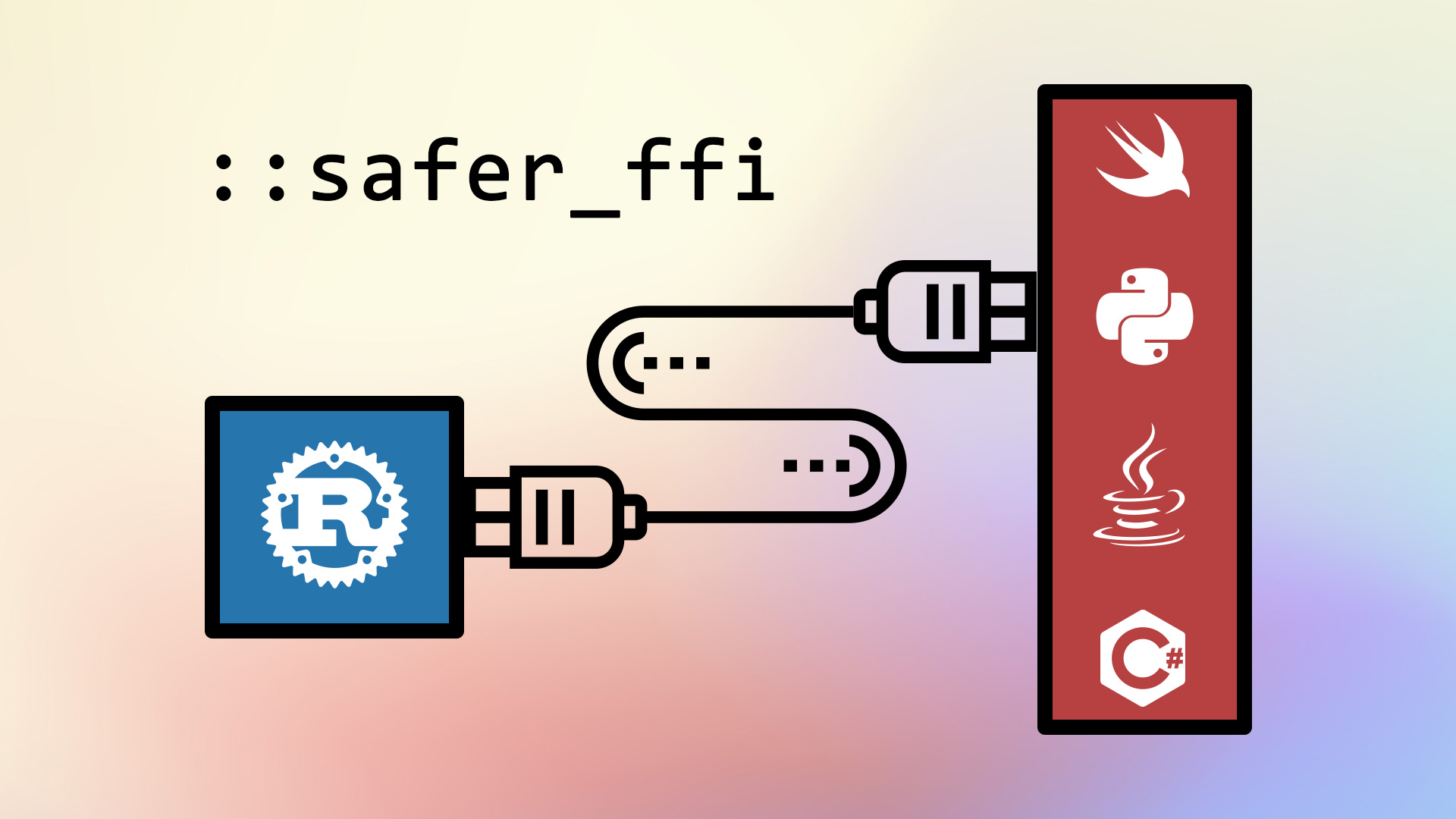
What is safer_ffi?
safer_ffi is a framework that helps you write foreign function interfaces (FFI) without polluting your Rust code with unsafe { ... } code blocks while making functions far easier to read and maintain.
Prerequisites
Minimum Supported Rust Version: 1.66.1
Quickstart
Click to hide
#### Small self-contained demo You may try working with the `examples/point` example embedded in the repo: ```bash git clone https://github.com/getditto/safer_ffi && cd safer_ffi (cd examples/point && make) ``` Otherwise, to start using `::safer_ffi`, follow the following steps: ### Crate layout #### Step 1: `Cargo.toml` Edit your `Cargo.toml` like so: ```toml [package] name = "crate_name" version = "0.1.0" edition = "2021" [lib] crate-type = [ "staticlib", # Ensure it gets compiled as a (static) C library # "cdylib", # If you want a shared/dynamic C library (advanced) "lib", # For `generate-headers` and other downstream rust dependents # such as integration `tests/`, doctests, and `examples/` ] [[bin]] name = "generate-headers" required-features = ["headers"] # Do not build unless generating headers. [dependencies] # Use `cargo add` or `cargo search` to find the latest values of x.y.z. # For instance: # cargo add safer-ffi safer-ffi.version = "x.y.z" safer-ffi.features = [] # you may add some later on. [features] # If you want to generate the headers, use a feature-gate # to opt into doing so: headers = ["safer-ffi/headers"] ``` - Where `"x.y.z"` ought to be replaced by the last released version, which you can find by running `cargo search safer-ffi`. - See the [dedicated chapter on `Cargo.toml`][cargo-toml] for more info. #### Step 2: `src/lib.rs` Then, to export a Rust function to FFI, add the [`#[derive_ReprC]`][derive_ReprC] and [`#[ffi_export]`][ffi_export] attributes like so: ```rust ,no_run use ::safer_ffi::prelude::*; /// A `struct` usable from both Rust and C #[derive_ReprC] #[repr(C)] #[derive(Debug, Clone, Copy)] pub struct Point { x: f64, y: f64, } /* Export a Rust function to the C world. */ /// Returns the middle point of `[a, b]`. #[ffi_export] fn mid_point(a: &Point, b: &Point) -> Point { Point { x: (a.x + b.x) / 2., y: (a.y + b.y) / 2., } } /// Pretty-prints a point using Rust's formatting logic. #[ffi_export] fn print_point(point: &Point) { println!("{:?}", point); } // The following function is only necessary for the header generation. #[cfg(feature = "headers")] // c.f. the `Cargo.toml` section pub fn generate_headers() -> ::std::io::Result<()> { ::safer_ffi::headers::builder() .to_file("rust_points.h")? .generate() } ``` - See [the dedicated chapter on `src/lib.rs`][lib-rs] for more info. #### Step 3: `src/bin/generate-headers.rs` ```rust ,ignore fn main() -> ::std::io::Result<()> { ::crate_name::generate_headers() } ``` ### Compilation & header generation ```bash # Compile the C library (in `target/{debug,release}/libcrate_name.ext`) cargo build # --release # Generate the C header cargo run --features headers --bin generate-headers ``` - See [the dedicated chapter on header generation][header-generation] for more info.Generated C header (rust_points.h)
```C
/*! \file */
/*******************************************
* *
* File auto-generated by `::safer_ffi`. *
* *
* Do not manually edit this file. *
* *
*******************************************/
#ifndef __RUST_CRATE_NAME__
#define __RUST_CRATE_NAME__
#ifdef __cplusplus
extern "C" {
#endif
#include Note regarding the extra -l… flags.
Those vary based on the version of the Rust standard library being used, and
the system being used to compile it. In order to reliably know which ones to
use, `rustc` itself ought to be queried for it.
Simple command:
```bash
rustc --crate-type=staticlib --print=native-static-libs -&1 | sed -nE 's/^note: native-static-libs: (.*)/\1/p'
```
Ideally, you would not query for this information _in a vacuum_ (_e.g._,
`/dev/null` file being used as input Rust code just above), and rather,
would apply it for your actual code being compiled:
```bash
cargo rustc -q -- --print=native-static-libs \
2>&1 | sed -nE 's/^note: native-static-libs: (.*)/\1/p'
```
And if you really wanted to polish things further, you could use the
JSON-formatted compiler output (this, for instance, avoids having to
redirect `stderr`). But then you'd have to use a JSON parser, such as `jq`:
```bash
RUST_STDLIB_DEPS=$(set -eo pipefail && \
cargo rustc \
--message-format=json \
-- --print=native-static-libs \
| jq -r '
select (.reason == "compiler-message")
| .message.message
' | sed -nE 's/^native-static-libs: (.*)/\1/p' \
)
```
and then use:
```bash
cc -o main{,.c} -L target/debug -l crate_name ${RUST_STDLIB_DEPS}
```
which does output:
Point { x: 42.0, y: 42.0 }🚀🚀
Development
Tests
safer-ffi includes three different tests suites that can be run.
# In the project root:
cargo test
# FFI tests
make -C ffi_tests
# JavaScript tests
make -C js_tests
# Running the JS tests also gives you instructions for running browser tests.
# Run this command in the `js_tests` directory, open a browser and navigate to
# http://localhost:13337/
wasm-pack build --target web && python3 -m http.server 13337


